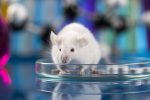Antibody Blocking Anticoagulation Enzyme Shows Promise in Mice

Treatment with an antibody designed to specifically block the anti-blood clotting, or anticoagulant, activity of an enzyme called activated protein C (APC) significantly reduced bleeding and related mortality in hemophilia A and hemophilia B mouse models, a study shows.
The antibody, called HAPC1573, was also found to improve blood clotting time in human blood lacking either blood clotting factor VIII (FVIII) or IX (FIX) — those missing in hemophilia A and B — as well as other clotting factors.
The findings highlight the therapeutic potential of suppressing the anticoagulant activity of APC to prevent bleeds in people with hemophilia and bleeding disorders lacking other clotting factors.
The study, “Blocking human protein C anticoagulant activity improves clotting defects of hemophilia mice expressing human protein C,” was published in Blood Advances.
Hemophilia is marked by the body’s impaired ability to prevent excessive bleeding due to defective or missing blood clotting factors — FVIII in the case of hemophilia A; FIX in hemophilia B.
In both cases, prophylaxis, or preventive replacement therapy, which provide the missing clotting factors for each hemophilia type directly into the bloodstream, is considered the gold standard to prevent spontaneous bleeding episodes. This approach has “major limitations,” however, the researchers wrote.
These include its short effect duration — therefore requiring frequent infusions — and the development of inhibitors, or antibodies against the delivered clotting factors, which can render the therapy useless.
Alternative approaches based on suppressing the body’s anticoagulant pathway have gained interest and targeting APC, a major enzyme of this pathway, showed promise in a mouse model of hemophilia B.
APC breaks down activated blood clotting factors V and VIII, thereby suppressing the generation of thrombin, the final enzyme in the coagulation pathway essential for blood clot formation.
Besides its anticoagulant effects, APC provides protection to cells against harmful processes by suppressing programmed cellular death and inflammation. As such, blocking only its anticoagulant activity is a potentially safer approach.
Now, a team of researchers at Shanghai RAAS Blood Products and Chinese Institutions evaluated the anti-bleeding effects of HAPC1573, an antibody designed to specifically block APC’s anticoagulant activity, in two mouse models of hemophilia A and B.
The models had been genetically modified to not only lack the corresponding blood clotting factors, but to also produce the human version of APC instead of the mouse version to more closely resemble what would happen in hemophilia patients.
The team first found that the human version of APC worked at sufficient levels to prevent bleeding in healthy mice, and that it did not affect the blood clotting activities of the mouse models of hemophilia A and B.
Pre-treating the hemophilia A model with HAPC1573 significantly reduced bleeding time when the tip of the tail was cut off relative to no treatment, and this was associated with a significant increase in thrombin generation to levels seen in healthy mice.
Notably, pre-treating the mice with both HAPC1573 and lab-made FVIII shortened the bleeding time to normal levels.
HAPC1573 pre-treatment also significantly reduced mortality and joint swelling (indicative of lower bleeding) in the mouse models of hemophilia A and B with induced knee-joint injury. HAPC1573’s effects were comparable to those seen with either lab-made FVIII or FIX.
The antibody also was found to normalize the clotting time of human blood lacking FVIII or FIX in a dose-dependent manner. Similar effects were observed using human blood lacking other clotting factors.
These findings highlight that “HAPC1573 effectively corrected the coagulation defects of hemophilia A or B mice challenged with tail transection or knee joint injury and rescued these mice from knee joint injury-induced mortality,” the researchers wrote.
The data also suggested that “selectively blocking the anticoagulant activity of human APC may be an effective therapeutic and/or prophylactic approach for bleeding disorders lacking FVIII, FIX, or other clotting factors,” they said.
Researchers are now working on developing an improved version of HAPC1573 that will bind strongly to APC and will be more suitable for testing in future clinical trials.







